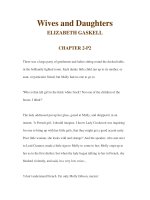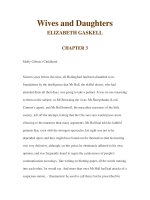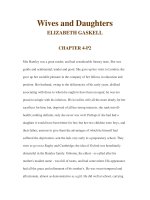Wives and Daughters ELIZABETH GASKELL CHAPTER 39-p1 potx
Bạn đang xem bản rút gọn của tài liệu. Xem và tải ngay bản đầy đủ của tài liệu tại đây (24.57 KB, 10 trang )
Wives and Daughters
ELIZABETH GASKELL
CHAPTER 39-p1
Secret Thoughts Ooze Out
Molly found Cynthia in the drawing-room, standing in the bow-window,
looking out on the garden. She started as Molly came up to her.
'Oh, Molly,' said she, putting her arms out towards her, 'I am always so glad to
have you with me!'
It was outbursts of affection such as these that always called Molly back, if she
had been ever so unconsciously wavering in her allegiance to Cynthia. She had
been wishing downstairs that Cynthia would be less reserved, and not have so
many secrets; but now it seemed almost like treason to have wanted her to be
anything but what she was. Never had any one more than Cynthia the power
spoken of by Goldsmith when he wrote, -
He threw off his friends like a huntsman his pack,
For he knew when he liked he could whistle them back.'
'Do you know, I think you'll be glad to hear what I've got to tell you?' said
Molly. 'I think you would really like to go to London; should not you?'
'Yes, but it is of no use liking,' said Cynthia. 'Don't you begin about it, Molly,
for the thing is settled; and I can't tell you why, but I can't go.'
'It is only the money, dear. And papa has been so kind about it. He wants you to
go; he thinks you ought to keep up relationships; and he is going to give you ten
pounds.'
'How kind he is!' said Cynthia. 'But I ought not to take it. I wish I had known
you years ago; I should have been different to what I am.'
'Never mind that! We like you as you are; we don't want you different. You'll
really hurt papa if you don't take it. Why do you hesitate? Do you think Roger
won't like it?'
'Roger! no, I was not thinking about him! Why should he care? I shall be there
and back again before he even hears about it.'
'Then you will go?' said Molly.
Cynthia thought for a minute or two. 'Yes, I will,' said she, at length. 'I daresay
it's not wise, but it will be pleasant, and I'll go. Where is Mr Gibson? I want to
thank him. Oh, how kind he is! Molly, you're a lucky girl!'
'I?' said Molly, quite startled at being told this; for she had been feeling as if so
many things were going wrong, almost as if they would never go right again.
'There he is!' said Cynthia. 'I hear him in the hall!' And down she flew, and
laying her hands on Mr Gibson's arm, she thanked him with such warm
impulsiveness, and in so pretty and caressing a manner, that something of his
old feeling of personal liking for her returned, and he forgot for a time the
causes of disapproval he had against her.
'There, there!' said he, 'that's enough, my dear! It is quite right you should keep
up with your relations; there's nothing more to be said about it.'
'I do think your father is the most charming man I know,' said Cynthia, on her
return to Molly; 'and it's that which always makes me so afraid of losing his
good opinion, and fret go when I think he is displeased with me. And now let us
think all about this London visit. It will be delightful, won't it? I can make ten
pounds go ever so far; and in some ways it will be such a comfort to get out of
Hollingford.'
'Will it?' said Molly, rather wistfully.
'Oh, yes! You know I don't mean that it will be a comfort to leave you; that will
be anything but a comfort. But, after all, a country town is a country town, and
London is London. You need not smile at my truisms; I've always had a
sympathy with M. de la Palisse, -
M. de la Palisse est mort
En perdant sa vie;
Un quart d'heure avant sa mort
Il etait en vie,'
sang she, in so gay a manner that she puzzled Molly, as she often did, by her
change of mood from the gloomy decision with which she had refused to accept
the invitation only half an hour ago. She suddenly took Molly round the waist,
and began waltzing round the room with her, to the imminent danger of the
various little tables, loaded with 'objets d'art' (as Mrs Gibson delighted to call
them) with which the drawing-room was crowded. She avoided them, however,
with her usual skill; but they both stood still at last, surprised at Mrs Gibson's
surprise, as she stood at the door, looking at the whirl going on before her.
'Upon my word, I only hope you are not going crazy, both of you? What's all
this about, pray?'
'Only because I'm so glad I'm going to London, mamma,' said Cynthia,
demurely.
'I'm not sure if it's quite the thing for an engaged young lady to be so much
beside herself at the prospect of gaiety. In my time, our great pleasure in our
lovers' absence was in thinking about them.'
'I should have thought that would have given you pain, because you would have
had to remember that they were away, which ought to have made you unhappy.
Now, to tell you the truth, just at the moment I had forgotten all about Roger. I
hope it was not very wrong. Osborne looks as if he did all my share as well as
his own of the fretting after Roger. How ill he looked yesterday!'
'Yes,' said Molly; 'I did not know if any one besides me had noticed it. I was
quite shocked.'
'Ah,' said Mrs. Gibson, 'I'm afraid that young man won't live long - very much
afraid,' and she shook her head ominously.
'Oh, what will happen if he dies!' exclaimed Molly, suddenly sitting down, and
thinking of that strange, mysterious wife who never made her appearance,
whose very existence was never spoken about - and Roger away too!
'Well, it would be very sad, of course, and we should all feel it very much, I've
no doubt; for I've always been very fond of Osborne; in fact, before Roger
became, as it were, my own flesh and blood, I liked Osborne better: but we must
not forget the living, dear Molly' (for Molly's eyes were filling with tears at the
dismal thoughts presented to her). 'Our dear good Roger would, I am sure, do all
in his power to fill Osborne's place in every way; and his marriage need not be
so long delayed.'
'Don't speak of that in the same breath as Osborne's life, mamma,' said Cynthia,
hastily.
'Why, my dear, it is a very natural thought. For poor Roger's sake, you know,
one wishes it not to be so very very long an engagement; and I was only
answering Molly's question, after all. One can't help following out one's
thoughts. People must die, you know - young, as well as old.'
'If I ever suspected Roger of following out his thoughts in a similar way,' said
Cynthia, 'I'd never speak to him again.'
'As if he would!' said Molly, warm in her turn. 'You know he never would; and
you should not suppose it of him, Cynthia - no, not even for a moment!'
'I can't see the great harm of it all, for my part,' said Mrs Gibson, plaintively. 'A
young man strikes us all as looking very ill - and I'm sure I'm sorry for it; but
illness very often leads to death. Surely you agree with me there, and what's the
harm of saying so? Then Molly asks what will happen if he dies; and I try to
answer her question. I don't like talking or thinking of death any more than any
one else; but I should think myself wanting in strength of mind if I could not
look forward to the consequences of death. I really think we're commanded to
do so, somewhere in the Bible or the Prayer-book.'
'Do you look forward to the consequences of my death, mamma?' asked
Cynthia.
'You really are the most unfeeling girl I ever met with,' said Mrs Gibson, really
hurt. 'I wish I could give you a little of my own sensitiveness, for I have too
much for my happiness. Don't let us speak of Osborne's looks again; ten to one
it was only some temporary over-fatigue, or some anxiety about Roger, or
perhaps a little fit of indigestion. I was very foolish to attribute it to anything
more serious, and dear papa might be displeased if he knew I had done so.
Medical men don't like other people to be making conjectures about health; they
consider it as trenching on their own particular province, and very proper I'm
sure. Now let us consider about your dress, Cynthia; I could not understand how
you had spent your money, and made so little show with it.'
'Mammal it may sound very cross, but I must tell Molly and you, and
everybody, once for all, that as I don't want and did not ask for more than my
allowance, I'm not going to answer any questions about what I do with it.' She
did not say this with any want of respect; but she said it with quiet
determination, which subdued her mother for the time, though often afterwards
when Mrs Gibson and Molly were alone, the former would start the wonder as
to what Cynthia could possibly have done with her money, and hunt each poor
conjecture through woods and valleys of doubt, till she was wearied out;' and
the exciting sport was given up for the day. At present, however, she confined
herself to the practical matter in hand; and the genius for millinery and dress,
inherent in both mother and daughter, soon settled a great many knotty points of
contrivance and taste, and then they all three set to work to 'gar auld claes look
amaist as weel's the new.'
Cynthia's relations with the squire had been very stationary ever since the visit
she had paid to the Hall the previous autumn. He had received them all at that
time with hospitable politeness, and he had also been more charmed with
Cynthia than he liked to acknowledge to himself when he thought the visit all
over afterwards.
'She's a pretty lass sure enough,' thought he, 'and has pretty ways about her too,
and likes to learn from older people, which is a good sign; but somehow I don't
like madam her mother, but still she is her mother, and the girl is her daughter;
yet she spoke to her once or twice as I should not ha' liked our little Fanny to
have spoken, if it had pleased God for her to ha' lived. No, it's not the right way,
and it may be a bit old-fashioned, but I like the right way. And then again she
took possession o' me as I may say, and little Molly had to run after us in the
garden walks that are too narrow for three, just like a little four-legged doggie;
and the other was so full of listening to me, she never turned round for to speak
a word to Molly. I don't mean to say they're not fond of each other, and that's in
Roger's sweetheart's favour, and it's very ungrateful in me to go and find fault
with a lass who was so civil to me, and had such a pretty way with her of
hanging on every word that fell from my lips. Well! a deal may come and go in
two years! and the lad says nothing to me about it. I'll be as deep as him, and
take no more notice of the affair till he comes home and tells me himself.'
So although the squire was always delighted to receive the little notes which
Cynthia sent to him every time she heard from Roger, and although this
attention on her part was melting the heart he tried to harden, he controlled
himself into writing her the briefest acknowledgements. His words were strong
in meaning, but formal in expression; she herself did not think much about
them, being satisfied to do the kind actions that called them forth. But her
mother criticized them and pondered them. She thought she had hit on the truth
when she had decided in her own mind that it was a very old-fashioned style,
and that he and his house and his furniture all wanted some of the brightening
up and polishing which they were sure to receive, when she never quite liked
to finish the sentence definitely, although she kept repeating to herself that
'there was no harm in it.'









